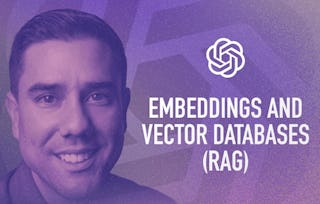Ready to boost your AI career by mastering next-level retrieval techniques for intelligent search and summarization? This hands-on course takes you deep into the world of Retrieval-Augmented Generation (RAG), advanced retrievers, and vector databases such as FAISS and Chroma DB. You'll gain the cutting-edge skills businesses need to design and build scalable, high-performance RAG applications that drive smarter search and response capabilities.

Advanced RAG with Vector Databases and Retrievers
本课程是多个项目的一部分。
8,837 人已注册
包含在 中
您将学到什么
Build RAG applications using vector databases and advanced retrieval patterns
Employ the core mechanics of Vector Databases such as FAISS and Chroma DB and implement indexing algorithms like HNSW
Implement advanced retrievers using LlamaIndex and LangChain to improve the quality of LLM responses
Develop comprehensive RAG applications by integrating LangChain, FAISS, and front-end user interfaces built using Gradio
您将获得的技能
要了解的详细信息

添加到您的领英档案
5 项作业
了解顶级公司的员工如何掌握热门技能

积累特定领域的专业知识
- 向行业专家学习新概念
- 获得对主题或工具的基础理解
- 通过实践项目培养工作相关技能
- 获得可共享的职业证书

该课程共有2个模块
In this module, you will get a deep dive into advanced retrievers and retrieval patterns, equipping you with the skills to implement and optimize advanced retrieval strategies within a RAG system. Participants will explore various retriever types through video lectures and hands-on labs, including vector store-backed, multi-query, self-querying, and parent document retrievers. Learners will apply these techniques using LangChain and LlamaIndex, gaining practical experience in building smarter search capabilities and enhancing retrieval efficiency in AI-driven applications.
涵盖的内容
5个视频2篇阅读材料3个作业4个应用程序项目1个讨论话题2个插件
In this module, you will explore FAISS, a powerful vector database used for efficient similarity search. You will compare FAISS with Chroma DB to understand its unique advantages and applications. Through hands-on experience, you will build a semantic search engine using FAISS in a non-RAG setting, demonstrating its versatility beyond retrieval-augmented generation (RAG). Finally, you will develop a fully functional RAG application, integrating FAISS, an advanced retriever, and a front-end UI built with Gradio. This module reinforces key RAG concepts while guiding learners through the process of creating an end-to-end AI-powered application.
涵盖的内容
2个视频3篇阅读材料2个作业3个应用程序项目2个插件
获得职业证书
将此证书添加到您的 LinkedIn 个人资料、简历或履历中。在社交媒体和绩效考核中分享。
提供方
从 Software Development 浏览更多内容
 状态:免费试用
状态:免费试用 状态:免费试用
状态:免费试用Edureka
人们为什么选择 Coursera 来帮助自己实现职业发展

Felipe M.

Jennifer J.

Larry W.

Chaitanya A.
常见问题
By mastering advanced RAG techniques and vector databases such as FAISS and Chroma DB, and learning to integrate with LangChain and Gradio, you'll be well-prepared for roles such as AI Developer, Data Engineer, AI Application Architect, Search Algorithm Engineer, or Technical Product Manager. These roles involve developing intelligent, efficient search systems, optimizing retrieval methods, and designing AI-driven applications that utilize advanced retrieval techniques.
No, machine learning experience is not a requirement! Although Python programming and an understanding of APIs and web development are recommended, this course focuses on implementing and optimizing retrieval systems using tools such as FAISS, LangChain, and Gradio. It's designed for developers and engineers looking to enhance their skills in building advanced search-driven AI applications without delving deeply into machine learning model training.
Traditional courses often focus on basic query optimization or relational databases. In contrast, this course dives deep into Retrieval-Augmented Generation (RAG) and advanced vector-based retrieval systems. You'll explore cutting-edge techniques such as similarity search, vector databases, and AI-driven retrieval strategies, applying these concepts to create dynamic, real-time, and context-aware search experiences. It's perfect for developers looking to leverage modern technologies for AI-enhanced search systems.
更多问题
提供助学金,







